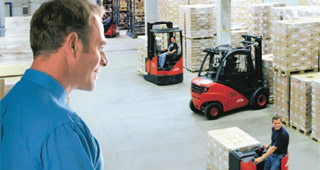 Larger companies or ones with more complicated forklift fleet needs should use fleet management software. |
Cheryl Bikowski is the marketing communications supervisor at Gamber-Johnson. Gamber-Johnson provides top-of-the-line forklift mounting systems to businesses in the materials handling industry.
Managing a fleet of forklifts in the materials handling industry is no small expense. You have to consider costly repairs, wasted employee time and possible damage resulting from forklifts that are not properly maintained. To manage a fleet without breaking the bank, you must have an eye for efficiencies and be willing to make investments where they are needed. Below are five ways a fleet manager can improve efficiencies and ultimately increase profits.
1. Keep Communications FlowingDisarray among your fleet will almost certainly cost you. Hold regular meetings with your fleet staff so that they are aware of any changes to routines or objectives. Even details that seemingly will not affect their day-to-day can be helpful if operators are able to spot some efficiencies on their own.
Similarly, encourage your forklift operators to communicate with you when there is an issue. For example, if they notice something that needs fixing, listen to them. They know best. Have a fleet manager or forklift technician keep a detailed log of what's been repaired, how often, whether more affordable alternatives have been effective and which parts are covered under warranty.
2. Structure Your Fleet by AgeYour forklifts will need to retire at some point. Knowing when can help you avoid costly repairs that will only buy you so much time. And more than likely, you've got a limited maintenance budget that you shouldn't waste on equipment that is ready to call it quits anyway.
So that you have a better idea for when a forklift should be retired versus when you should invest in repairs, try classifying your entire fleet by the age of the machines. Three categories of age - new, middle and old - are typically manageable while giving you enough flexibility to make the right decision. Based on each category, you can then decide how much money in repairs you are willing to spend for each group.
3. Use Fleet Management SoftwareLarger companies or ones with more complicated forklift fleet needs should use fleet management software. Fleet management software can help you keep a closer eye on expenses by letting you know what is being used, and when. It can help you identify efficiencies, as well as give you the ability to identify which locations and tasks are costing you the most money. This can help you make adjustments to significantly cut operating costs. You can also better spot idle time, which leads to the next recommendation.
4. Keep an Eye on Comings and GoingsTrust can only take you so far. And too much trust can be expensive. You should have the ability to know what your workers are doing with their time - whether you track with management software, detailed timekeeping or strict supervision. It also helps to know which forklifts that employees are typically using so that you can spot any human error trends.
Don't operate in secret. Let your forklift operators know that they are being observed. They likely will perform more consistently and at higher levels if they know their performance is being tracked.
5. Accessorise Your Fleet to be More EfficientYou should be willing to invest in your fleet to improve efficiency and extend the life of your equipment. For example, a mounted camera can help an operator more accurately operate the forklift and properly place objects, potentially preventing expensive mistakes. Similarly, you can protect the pallets themselves by investing in bolt-on guards. This can reduce wear over time and reduce labour costs related to cleanup.
Another efficiency-boosting accessory is booms, which extend the reach of a forklift and allow it to pick up a wider range of objects. Booms can increase the versatility of your forklift, allowing your crew to take on more jobs or consolidate lifting work.
Other forklift accessories can protect equipment and enhance performance so that you are better able to get your money's worth.